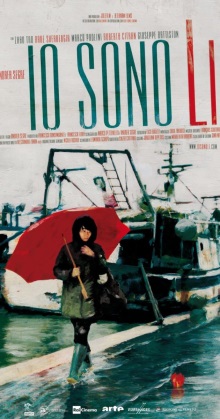
This film was one of wife’s picks to add to our regularly maintained “to watch” list. It’s ostensibly an Italian film, with an Italian director, filmed in the province of Venice and making use of a largely Italian crew. Yet it has a Chinese lead and many supporting roles with Chinese actors and actresses. The dialogue is pretty much half Italian and half Mandarin Chinese.
As you might expect from just this blurb, this film is about alienation and the clash of cultures. On the one hand, we have Shun Li, a Chinese immigrant who starts out barely speaking any Italian and is forced by her bosses to whom she owes money to work in a bar in Chioggia, a small fishing town near Venice. On the other, we have Bepi, an elderly fisherman and bar regular. Though he has lived in Italy for 30 years, he is occasionally reminded that he is originally of Slavic origin.
In different ways, both suffer from terrible loneliness and find comfort in an unlikely friendship. Bepi, perhaps, remembers his own immigrant origins and is more tolerant of Shun Li’s fumbling of the Italian language. For her part, Shun Li, being an admirer of the Chinese poet Qu Yuan, is intrigued that Bepi is nicknamed the Poet by his friends due to his fondness of rhymes. Yet their friendship disturbs both the Chinese and the local community. Shun Li’s bosses want their employees to treat the Italians only as customers. The Italians for their part suspects Shun Li of being a gold-digger and sees this as yet another symptom of a Chinese invasion of immigrants and future competitors.
The story is told in a subdued, low-key manner, free of drama or histrionics. The provincial quality of Chioggia serves to further ground the film in quiet realism. Equally impressive is how deftly the director refrains from ramming home any any moral or political messages. We can sympathize with how Shun Li is essentially is indentured to her Chinese bosses in exchange for the promise that her son will one day be sent to Italy once she earns enough without having to hear a tirade about the evils of globalization for example. And we can see how the Italians can be casually racist without needing to be evil.
Another interesting choice that intrigues me is the character of Shun Li’s room-mate Lian. We see her practising tai chi on the beach and help Shun Li in little ways. The film never deigns to directly tell us what she does or her life story, but there are hints throughout the film that her life is even sadder than that of Shun Li. It’s yet another good example of the incredible dramatic restraint that the director exercises in this film.
I was less impressed with the attempts to link the mood of the film to poetry. It felt overly florid to me and it never struck me that Bepi earned the sobriquet of the Poet. You only need to look at the official website of the film to see how seriously the director takes the poetry theme but it seems like a distraction to me. The scenes of everyday life in Chioggia and the interactions of the regular customers of the bar Shun Li works in are the elements that bring the film to life, not the poetic metaphors.
Overall this is a worthy and competent film but I wouldn’t say it is an exceptional one. It touches on common themes that we’ve probably all seen elsewhere already, albeit in a picturesque context. And as my wife states, it’s a film about mood and emotion whereas I generally prefer films to be more intellectual. But a good watch all the same.